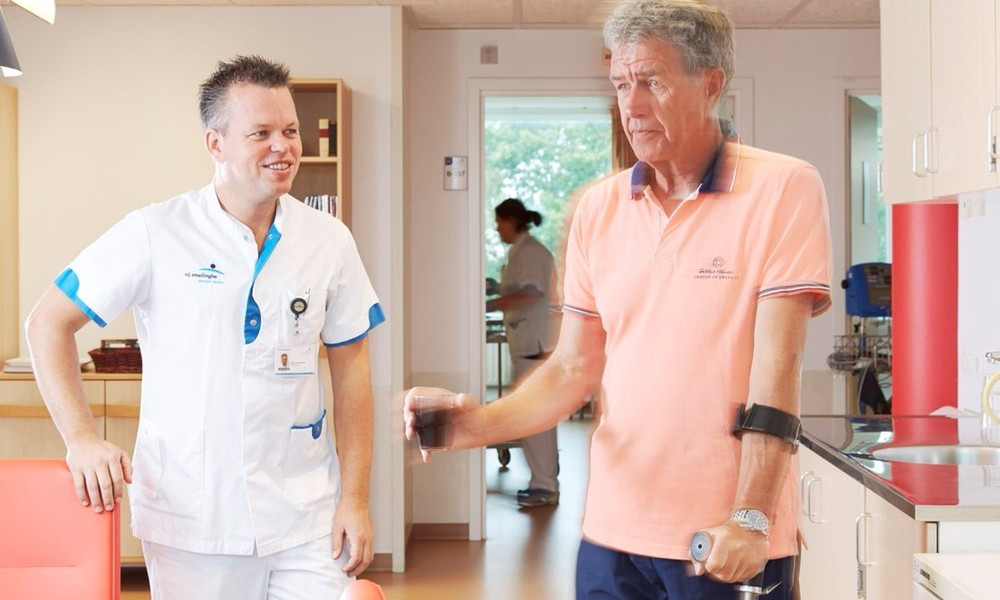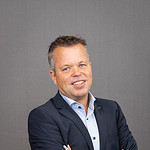How do you get people to recover as quickly as possible after a hospital admission?
- Research stories

'Being admitted to hospital is an impactful event, especially for the elderly,' says Geert van der Sluis of Nij Smellinghe hospital in Drachten. 'For thirty percent of older patients, the physical and mental impact is quite considerable. They could lose physical or mental functions either temporarily or permanently. This has consequences for their daily lives, think for example for activities such as cycling, gardening, social visits, travelling or playing with the grandchildren.'
But with a specially tailored programme, patients can train to become physically and mentally fitter before surgery. This reduces the risk of complications by as much as fifty percent and patients also recover much faster. This is called prehabilitation.
On 1 November 2021, Geert van der Sluis started as professor by special appointment of 'Functioning and participation in hospital admissions' at Hanze University of Applied Sciences. This professorship connects science, practice and education. By developing knowledge in the field of day-to-day care and initiatives to improve care, temporary or permanent loss of physical and/or mental functions in patients due to hospitalizations and medical treatment can be significantly reduced.
'The picture that people are used to is that people walk into hospital for an operation. They go to their room, put on their pyjamas, lie down and give themselves up to the circumstances,' says Geert van der Sluis. 'Often people in hospital are inactive for twenty-two hours out of twenty-four. We are in the process of initiating a counter-movement. The patient comes in, and goes to a central admission room where he or she can do some work, reading or other activities. When the time comes, they walk to the operating room themselves, where they change clothes and are prepared for the operation. So the patient is in control for as long as possible.'
During his PhD research between 2013 and 2018, Geert van der Sluis was already working on experiments on how best to use physiotherapy to get patients moving. It was often the case that the physiotherapist came in at ten o'clock in the morning, did a round and left the nursing ward at twelve o'clock. Now he or she is part of the nursing team. They work together and look at what the patient needs in consultation with the patient him- or herself.
Geert van der Sluis: 'I was a physiotherapist and a researcher, but not a researcher who was sitting alone in an office. On the contrary, I wanted to see what was happening in practice. That made it easier to switch gears and involve colleagues in the developments. According to the concept of embedded science, i.e. doing science with your feet in the clay, to make the lives of patients better. When collecting data during my PhD research, I noticed things about how much impact a hospital admission has, and I knew I had to do something with that. 'We saw in thirty percent of hospital admissions that people have lasting consequences as a result of the operation. That's intense. I think that's a big social problem. People go to hospital and think they're getting better, but they leave twenty-five percent of their physical condition on the operating table. Of course, we are good at recovering from diseases, but we sometimes forget the impact of such an admission.'
Geert was convinced that there had to be another way. But how do you go about something like that? How do you ensure, for example, that a team of healthcare professionals starts thinking and acting differently? Geert: 'I started organising informative get-togethers, where people spoke to each other in an informal way. It was my intention to keep the tone light, so as not to give a weighty message that things had to be done differently. The idea was to let people talk to each other and so to let awareness grow slowly. I noticed that people gradually became more and more enthusiastic, they really saw something in it. There has been a gradual change in awareness.'
A different way of thinking also allows for a different approach. And the team in Nij Smellinghe started investigating: why does one person have the resilience to come out of an operation well and another does not? If you can map that out, you can also come up with and offer solutions. This is what the research from the research group 'Functioning and participation around hospital admissions' is about. Who possesses that resilience? Who is at risk? Geert van der Sluis: 'You can compare an operation to running a marathon. If you look at a marathon runner, he will make sure he gets the best possible preparation weeks in advance by working on his condition. This continues until the last minute and also on the day itself. Eat well, sleep well and exercise well and all this at the right time. Also important is good aftercare, of course, sometimes with physiotherapy. With this approach, the physical, but also the mental recovery is much faster.'
Geert: 'Before the operation, we look at: how does someone come in? Because that's exactly what can make the difference. Take someone who needs knee surgery. If it has been decided that an operation can go ahead and the date has been set, we will contact the patient. That is the start of the preliminary phase. We make an appointment, and look at the patient's condition. For example, we take a cycling test; by means of questionnaires we look at a person's nutritional status, psychological resilience, geriatric vulnerability, intoxications, i.e. smoking and drinking behaviour, and finally we measure the iron level in the blood. This creates a complete picture of the patient's fitness. Based on this, we make a treatment programme, mainly focused on nutrition and exercise, because this area is most advanced as far as our research is concerned. For this screening, the patient has to come to the hospital a maximum of two times and within a week we have put together a tailor-made programme and discussed it with the patient. And for that whole programme we take about four to six weeks. At home, the patient works with the physiotherapist; a dietician supervises the diet and often people stop smoking and drinking, although that may be temporarily. But for many people, a medical procedure is a game changer. Those are the moments when people really start to think about their behaviour and their habits and the consequences. As a result, they are more open to changing their behaviour.'
Mrs. M., a patient of Nij Smellinghe, was on the list for knee surgery. Actually, she couldn't wait any longer. Because exercise hurt, she didn't go out much anymore and she didn't mingle with people as much as she would like. As a result, she also had depressive symptoms. Geert: 'We saw that she would really benefit from a preoperative training programme. She already had a date for the operation and was very happy that it was finally her turn. So she was not at all happy with our proposal to postpone the operation and take six weeks to prepare better. But her daughter managed to convince her. At the first training she was very sceptical, but after she had attended about three times, we already saw a change. She went out on her own again, went for walks and visited friends. As a result, her depressive symptoms also decreased. She was much more in control and experienced first-hand that what she could do herself made a big difference.' On Monday, Mrs. M. was operated on and on Tuesday she went for a walk on the ward with her walker on her own initiative, chatting with the other patients. After two days she was able to go home and after five days she went to of one of her grandchildren’s birthday party. Whereas before the operation, the prospect had been that she would first spend five days in hospital and then at least three weeks in a rehabilitation institute.
Geert: 'This is exactly what we want, for people to be back on their feet as soon as possible after the operation. This way, they experience daily doings and challenges and discover what they can and cannot do. We coach them with these daily challenges, and how they can deal with them. In this way, they are also much better prepared for life at home and they can be active in their own environment much sooner.'
Stories like Mrs. M's also stimulate research into this approach. For the Healthy Ageing Allied Health Care and Nursing research group, where Geert is a professor, he wrote a special teaching assignment on this subject, involving students and lecturers from various programmes at Hanze University of Applied Sciences and healthcare professionals from Nij Smellinghe. Geert van der Sluis: 'Together with patients, students, healthcare professionals and academics, we learn and develop in practice. We combine local practice-based academic research in and around the hospital with comparative research between hospitals. In this way, we broaden and share our knowledge, something that can greatly benefit patients. In the hospital, my colleagues and I experience every day that we can still make great strides in improving sustainable care for patients together and, above all, what the patients themselves can do to help.'

Bijzonder lector Functioneren en participeren rondom ziekenhuisopnames
How satisfied are you with the information on this page?